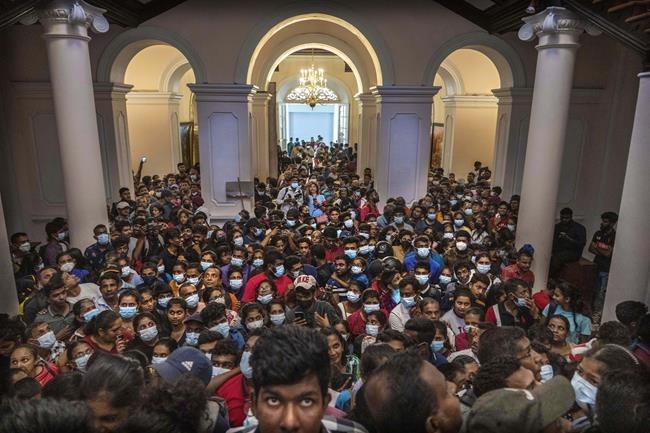TORONTO — Some Sri Lankans living in Canada are welcoming the promised resignations of that country's embattled leaders, after protesters angered by economic collapse stormed the homes of the president and prime minister over the weekend.
Sri Lankan President Gotabaya Rajapaksa and Prime Minister Ranil Wickremesinghe conceded on Saturday to demands from protesters to resign over corruption and mismanagement that has led to the country's deepening crisis. Rajapaksa promised to step down Wednesday, while Wickremesinghe said he would leave once a new government is in place.
Sena Munasinghe, president of the Sri Lanka Canada Association of Brampton, said the leaders' resignations are "long overdue" but added it's unfortunate that it took violence and the destruction of property for them to step down.
"Destroying property and damaging things will not help anyone, that will make (the situation) more bad than it is currently," he said. "There is no control and the police cannot maintain law and order in the country, so it's a really bad situation."
Munasinghe, who immigrated to Canada from Sri Lanka in 2004, initially backed Rajapaksa and supported the president for years, but said amid the country's economic meltdown and deepening political turmoil it was time for someone else to take over.
After three months of protests, the resignations have brought no end to the crisis that has left the island nation laden with debt and brought suffering to its 22 million people through severe shortages of food, fuel and medicine.
The protesters have vowed to occupy official buildings until the top leaders are gone from office. For days, Sri Lankans have flocked to the presidential palace as if it were a tourist attraction – swimming in the pool, marvelling at the paintings and lounging on the beds piled high with pillows.
Archana Ravichandradeva, executive director of People for Equality and Relief in Lanka, said she had mixed reactions upon seeing images of protesters occupying the officials' residences and hopes the transfer of power will bring change for all Sri Lankans.
"Tamils have been protesting for a very long time and have constantly been met with the barrel of a gun," she said.
Ravichandradeva, whose family fled Sri Lanka in 1998 when she was four years old and who now lives in Markham, Ont., said Tamils have been raising the alarm against Rajapaksa and leaders like him for decades.
Appealing to the nationalist sentiment of the island's Buddhist-Sinhalese majority, Rajapaksa led Sri Lanka to a triumphant victory over ethnic Tamil rebels in 2009, ending a 26-year brutal civil war that divided the country. Rajapaksa's whereabouts are currently unknown.
Ravichandradeva said the economic issues the rest of the country is facing – such as restricted fuel and citizens being limited to one meal per day – have been experienced by Tamils in Sri Lanka's northeast region during and since the war.
"The rest of the country is now catching up to what Tamils have always known about the country and these leaders," she said.
Katpana Nagendra, secretary and spokesperson for the Tamil Rights Group based in Markham, Ont., said the organization welcomes the change in regime but wonders if it will bring meaningful change.
"Had the Tamil people protested the way the groups are protesting in Sri Lanka right now against the government, we probably would not have been given that liberty to be able to storm into the presidential palace. We would have definitely been shot at," Nagendra said.
"It's disheartening to see that we didn't have the same civil liberties, but all of the power to the groups that are protesting against the government."
Both People for Equality and Relief in Lanka and the Tamil Rights Group said they want to see Rajapaksa, as well as other Sri Lankan leaders with ties to his family, tried for allegations of genocide and war crimes against the Tamil people.
The Canadian Tamil Congress released a statement Tuesday calling for a peaceful and democratic transition of power for all citizens. The organization alleged the Rajapaksa regime brought rampant corruption, nepotism, scant regards for minority rights, racist laws and poor fiscal policies to Sri Lanka.
It said Tamils in Sri Lanka and the diaspora will soon remember the 39th anniversary of "Black July '83 when thousands of Tamils were killed and billions in Tamil properties were looted or destroyed."
It stated that more than a million Tamils have since left the country for safer homes, including Canada.
Sri Lankan lawmakers agreed late Monday to elect a new president from their ranks on July 20 but have not yet decided who will take over as prime minister and fill the Cabinet.
This report by The Canadian Press was first published July 12, 2022.
– With files from The Associated Press
Tyler Griffin, The Canadian Press




